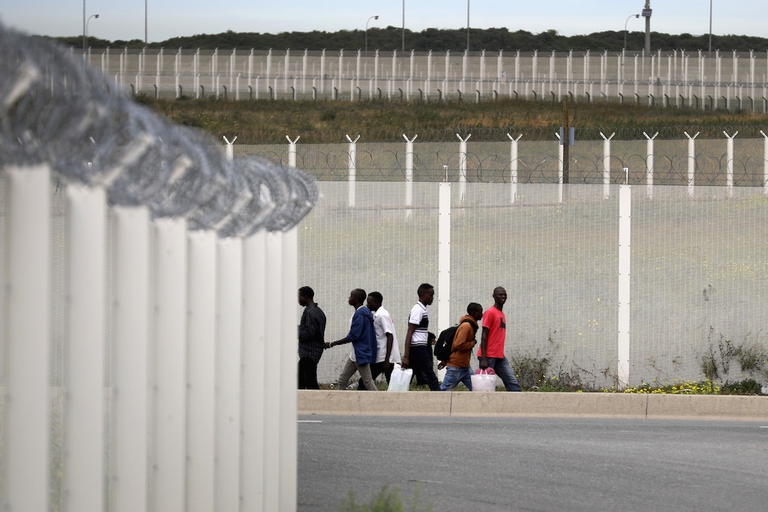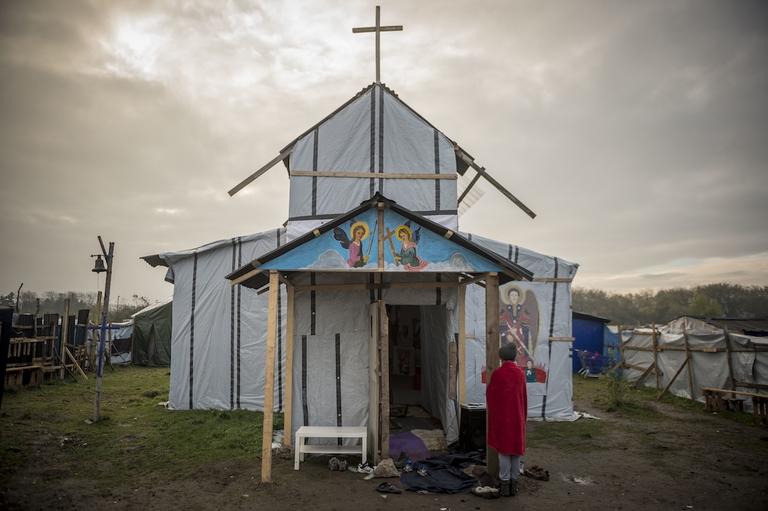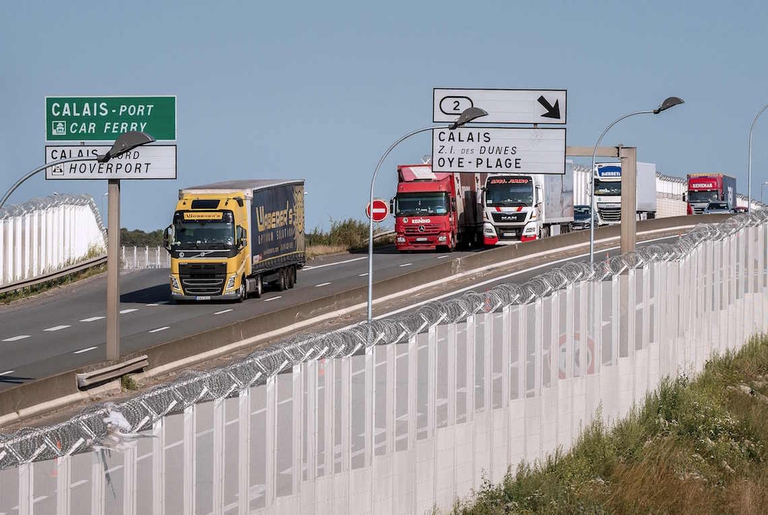
The Louise Michel is the humanitarian rescue ship saving lives in the Mediterranean. Financed by the artist Banksy, it has found a safe port in Sicily.
The UK will build a kilometre-long, 4-metre high wall in Calais, France in an effort to block refugees from entering the country. The wall is designed to stop those living in the nearby encampment dubbed “the Jungle” from climbing into lorries and other vehicles heading to the UK through the port of Calais and the Eurotunnel. There
The UK will build a kilometre-long, 4-metre high wall in Calais, France in an effort to block refugees from entering the country. The wall is designed to stop those living in the nearby encampment dubbed “the Jungle” from climbing into lorries and other vehicles heading to the UK through the port of Calais and the Eurotunnel.
There were 22,000 “breaches of the port road defence” by refugees in June 2016 alone according to French police commissioner Patrick Visser-Bourdon. Britain has agreed to pay for the construction of the wall that will cost an estimated 2.3 million British pounds (around 2.25 million euros). These will come out of a 17 million pound fund (over 20 million euros) given by the UK government to French authorities in March 2016 to finance the strengthening of border controls. The stated reasons for this agreement and construction of the wall are reducing the disruption to the port that is caused by refugees attempting to climb into lorries, as well as keeping refugees out of the UK.
The refugee encampment is home to an estimated 5,000 to 10,000 people – of which over 600 are unaccompanied children – coming primarily from war-torn countries such as Somalia, Sudan, Iraq, Eritrea, Syria and Afghanistan. Many refugees risk their lives on a daily basis as they attempt to travel to the UK.
This had led to tension with lorry drivers and Calais residents calling for the closure of the camp, with claims that refugees have threatened lorry drivers. The tension between locals and those living in the Jungle has led to an “apartheid state“, according the Calais Migrant Solidarity organisation, which states that shops, bars, supermarkets and local hospitals refuse entry to refugees. Within the camp itself, aid workers have said that they’re “running out of tents, food, and space because so many new people are arriving everyday“.
The reasons refugees are heading to the UK, despite having reached Europe already, are numerous. A key one is that for those who speak English already, the UK is a more attractive destination than other countries. In addition, family connections tie many in the camp to the UK, as there are already large Eritrean, Afghani and Pakistani communities in the country, for example.
The building of the wall, which will run along the main road to the port in Calais, will add to the present security measures in place that include barbed wire and fencing. Many have argued, including lorry drivers themselves, that the wall is not the answer. “The decision to build a wall in Calais is the latest wrong move in what is the ongoing scandal of the handling of the plight of refugees in northern France,” according to Jean Lambert, European Parliament member and spokesperson for the British Green Party.
This measure is part of a wider process throughout Europe of seeking to build physical barriers to stop refugees from entering certain parts of the continent, with walls constructed also along the Hungarian and Austrian borders. As refugees continue escaping conflict zones including Syria and Afghanistan, walls remain non-solutions to a deep humanitarian crisis.
Siamo anche su WhatsApp. Segui il canale ufficiale LifeGate per restare aggiornata, aggiornato sulle ultime notizie e sulle nostre attività.
![]()
Quest'opera è distribuita con Licenza Creative Commons Attribuzione - Non commerciale - Non opere derivate 4.0 Internazionale.
The Louise Michel is the humanitarian rescue ship saving lives in the Mediterranean. Financed by the artist Banksy, it has found a safe port in Sicily.
Venezuelan refugees are vulnerable to the worsening outbreak in South America: while coronavirus doesn’t discriminate, it does affect some people more than others.
In the midst of India’s coronavirus lockdown, two dozen people lost their lives in a desperate bid to return home: migrant labourers forced to leave the cities where they worked once starvation began knocking at their doors.
Behrouz Boochani returned to being a free man during the course of this interview. The Kurdish writer was imprisoned by the Australian government in Papua New Guinea for six years.
The Global Compact for Safe, Orderly and Regular Migration was signed by 164 nations in Marrakech. This is what the non-binding agreement that encourages international cooperation stipulates.
The winners of the World Press Photo 2019 tell the stories of migrants in the Americas. From the iconic image of a girl crying on the border between Mexico and the United States to the thousands of people walking from Honduras towards a better life.
The Semìno project is a journey of discovery through different countries’ food habits, offering migrants employment opportunities and allowing us to enjoy the properties of vegetables from all over the world.
Travelling across the new route used by migrants to cross the Balkans and reach Trieste in Italy, a reportage that documents the social, economic and political changes of the countries along the way.
The countries hosting the most refugees aren’t the wealthy, Western ones. An overview by NGO Action Against Hunger reminds us that refugees and internally displaced people are far from being safe.










